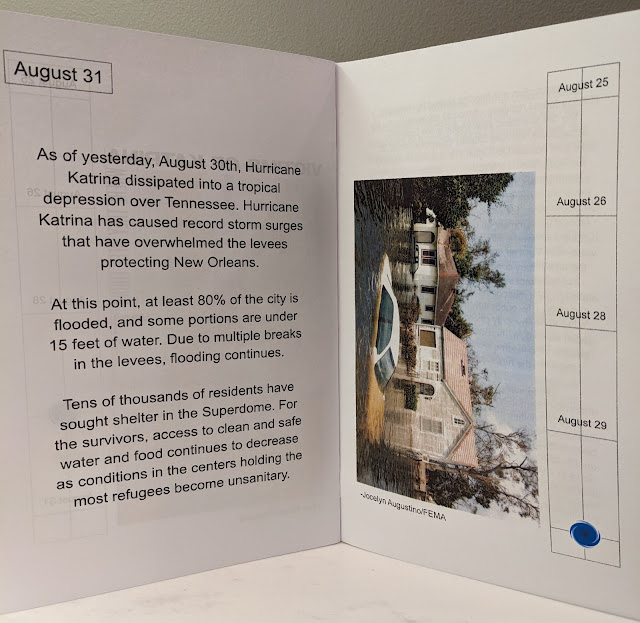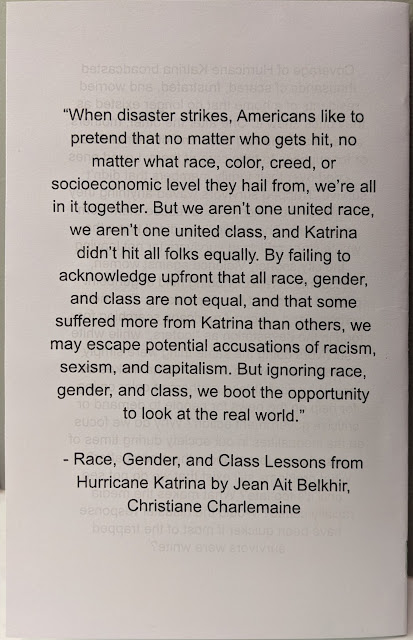Welcome back to my blog! This post is for the first Action Project of the Humanities class, Equality. In this first unit, we have learned about equality and how to reach an egalitarian society. We also dove into intersectionality, sociology, and social stratification. We started reading There There by Tommy Orange, a novel following the stories of Native American characters in Oakland grappling with a complex and painful history and identity. With the idea of creating zines for our Action Project, we had multiple Field Experiences that gave us a chance to observe and study all kinds of zines. These FEs include looking at the zine collection in the Joseph Regenstein Library at the University of Chicago, Co-Prosperity artist space and gallery to investigate underground and independent media, and Howling Pages Comics, where the owner promotes zines created by young people and small press or independent comics. This Action Project asks us to choose a historical event that exemplifies the marginalization of people based on race, gender, and class. I decided to investigate Hurricane Katrina because of its effect on the country, but more importantly, everyone that was in the hurricane's path. My zine will follow Hurricane Katrina as a news report and then focus on the aftermath using the inequalities of race, gender, and class as guiding points. I hope you enjoy looking at my zine, Spilling Into Something Else!
Elliott, James R., and Jeremy Pais. “Race, Class, and Hurricane Katrina: Social Differences in Human Responses to Disaster.” Social Science Research, Academic Press, 24 Apr. 2006, https://www.sciencedirect.com/science/article/pii/S0049089X06000135. Accessed 5 Feb. 2023.
Enarson, Elaine. “Women and Girls Last? Averting the Second Post-Katrina Disaster.” Items, Items, 30 May 2019, https://items.ssrc.org/understanding-katrina/women-and-girls-last-averting-the-second-post-katrina-disaster/. Accessed 5 Feb. 2023.
History.com Editors. “Hurricane Katrina Slams into Gulf Coast.” HISTORY, A&E Television Networks, 24 Nov. 2009, https://www.history.com/this-day-in-history/hurricane-katrina-slams-into-gulf-coast. Accessed 5 Feb. 2023.
Pruitt, Sarah. “How Levee Failures Made Hurricane Katrina a Bigger Disaster.” HISTORY, 27 Aug. 2020, https://www.history.com/news/hurricane-katrina-levee-failures. Accessed 5 Feb. 2023.
Pruitt, Sarah. “Hurricane Katrina: 10 Facts about the Deadly Storm and Its Legacy.” HISTORY, 19 Aug. 2020, https://www.history.com/news/hurricane-katrina-facts-legacy. Accessed 5 Feb. 2023.
Front Cover, GS, 2023
Pages 1-2, GS, 2023
Pages 3-4, GS, 2023
Pages 5-6, GS, 2023
Pages 7-8, GS, 2023
Pages 9-10, GS, 2023
Pages 11-12, GS, 2023
Pages 13-14, GS, 2023
Pages 15-16, GS, 2023
Pages 17-18, GS, 2023
Back Cover, GS, 2023
I hope you enjoyed reading Spilling Into Something Else. This zine brought together a lot of information in a small space and took a lot of effort. To enhance the feel of looking at Hurricane Katrina as a news report, I used a few communication tools or educational devices. The first is a timeline that shows the different days being covered and tracks the hurricane's progress. The second are my quotations from New Orleans Mayor Ray Nagin and the book Race, Gender, and Class Lessons from Hurricane Katrina by Jean Ait Belkhir and Christiane Charlemaine. I found these quotes to be very impactful and useful for the information I wanted to share. The third type of communicational tool I used was the many photographs that I hoped would make the reader feel like they were looking at the storm and destruction for the first time. The fourth and fifth tools were the maps and graphics showing the impact of Hurricane Katrina on New Orleans and Florida. I also chose to make each page spread one day on my report to get the most out of the space I had and make the zine feel like a TV screen.
This Action Project made me move outside of my comfort zone for a bit. Initially, I struggled piecing together how I would write about Hurricane Katrina and how it affected marginalized groups, which I cannot relate to as much as others. I also had a hard time envisioning what I would want my zine to look like or how an essay I wrote about my topic would fit in a zine format. But these challenges and the experiences from our FEs led me to see that a zine can be made however you want it to be. I think finding this freedom helped me see the process from a new perspective and I ended up enjoying the work that I was creating and saw myself looking to improve on the progress I had made. If I had some more time to work on the zine, I would try to refine the formatting, include more graphic design elements, or make the pages a different color. I am very happy with how my zine turned out and excited to see my classmate's zines as well. Thank you for reading and I hope to see you in the next post.
Sources:
Belkhir, Jean Ait, and Christiane Charlemaine. “Race, Gender and Class Lessons from Hurricane Katrina.” Race, Gender & Class, vol. 14, no. 1/2, 2007, pp. 120–52. JSTOR, http://www.jstor.org/stable/41675200. Accessed 5 Feb. 2023.Elliott, James R., and Jeremy Pais. “Race, Class, and Hurricane Katrina: Social Differences in Human Responses to Disaster.” Social Science Research, Academic Press, 24 Apr. 2006, https://www.sciencedirect.com/science/article/pii/S0049089X06000135. Accessed 5 Feb. 2023.
Enarson, Elaine. “Women and Girls Last? Averting the Second Post-Katrina Disaster.” Items, Items, 30 May 2019, https://items.ssrc.org/understanding-katrina/women-and-girls-last-averting-the-second-post-katrina-disaster/. Accessed 5 Feb. 2023.
History.com Editors. “Hurricane Katrina Slams into Gulf Coast.” HISTORY, A&E Television Networks, 24 Nov. 2009, https://www.history.com/this-day-in-history/hurricane-katrina-slams-into-gulf-coast. Accessed 5 Feb. 2023.
Pruitt, Sarah. “How Levee Failures Made Hurricane Katrina a Bigger Disaster.” HISTORY, 27 Aug. 2020, https://www.history.com/news/hurricane-katrina-levee-failures. Accessed 5 Feb. 2023.
Pruitt, Sarah. “Hurricane Katrina: 10 Facts about the Deadly Storm and Its Legacy.” HISTORY, 19 Aug. 2020, https://www.history.com/news/hurricane-katrina-facts-legacy. Accessed 5 Feb. 2023.
Reid, Kathryn. “2005 Hurricane Katrina: Facts, Faqs, and How to Help.” World Vision, 12 May 2020, https://www.worldvision.org/disaster-relief-news-stories/2005-hurricane-katrina-facts. Accessed 5 Feb. 2023.











Comments
Post a Comment